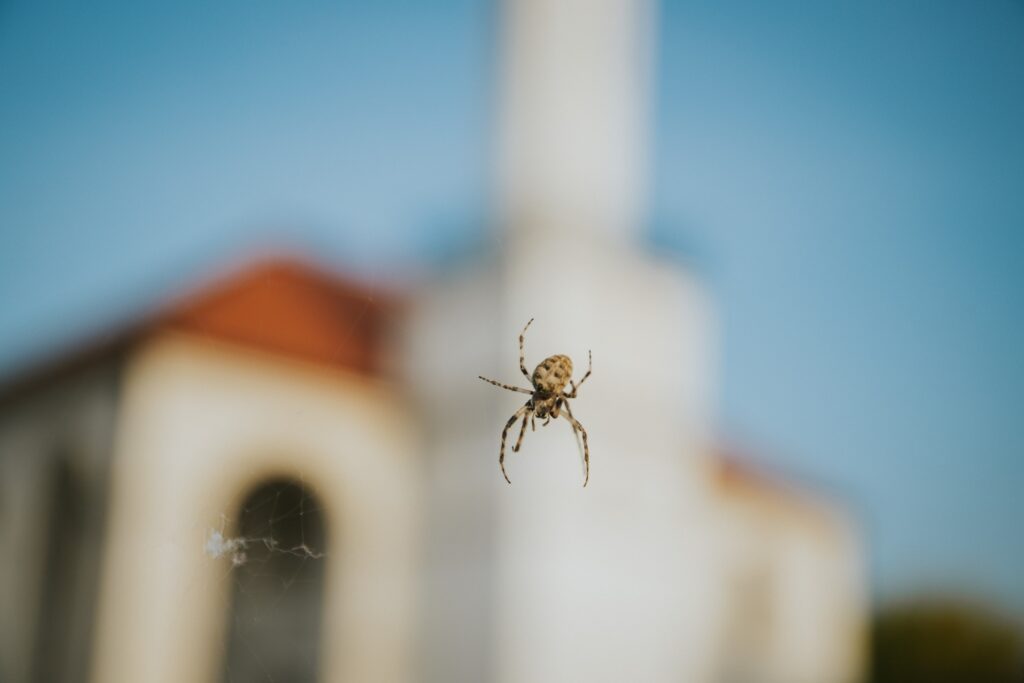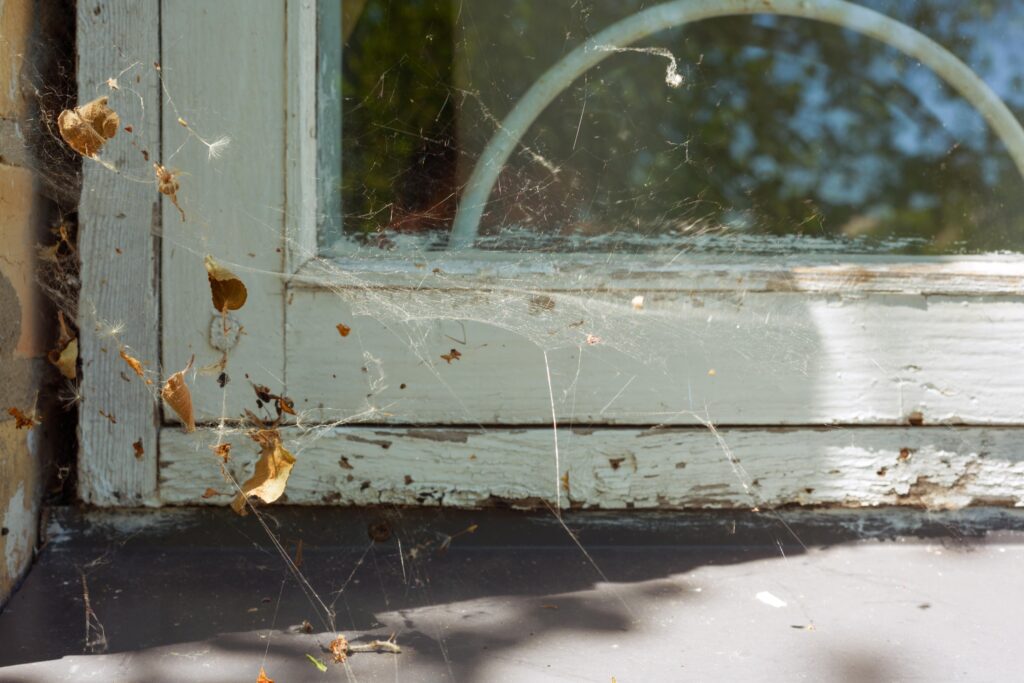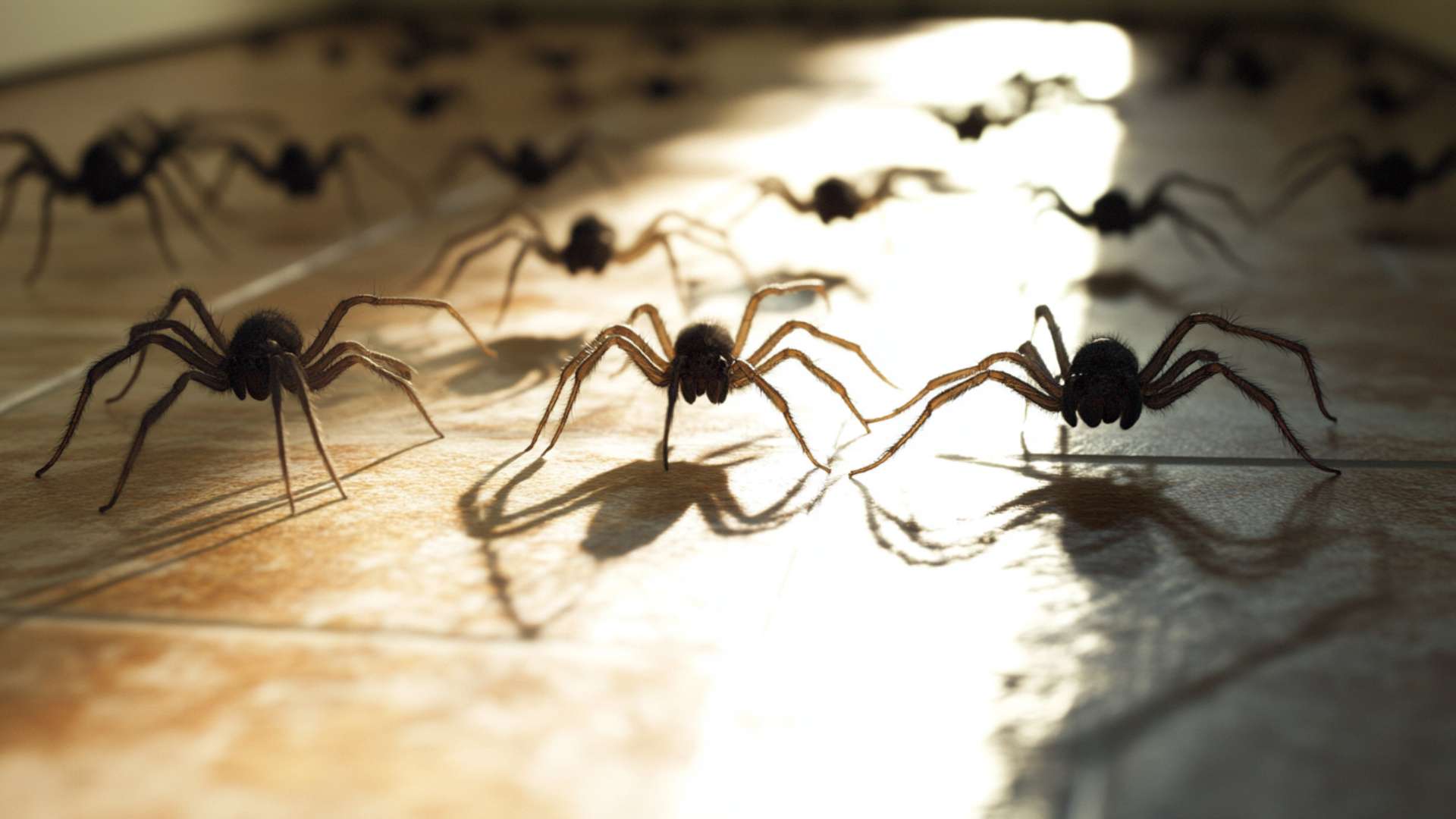The Annoyance of Having Spiders on Your Porch
Imagine stepping out onto your porch, hoping to enjoy a relaxing evening outdoors, but instead finding yourself surrounded by creepy crawlers. Yes, spiders can be quite the nuisance when they decide to take up residence on your porch.
Their presence can evoke unease and distress, especially for those with arachnophobia. Not only do they startle us with their sudden appearances or unexpected spider web encounters, but they also seem to have an uncanny ability to spin webs in every nook and cranny imaginable – from window sills to outdoor furniture – leaving us frustrated and constantly battling their relentless creations.
Importance of Keeping Spiders Away for a Clean and Inviting Outdoor Space

Beyond the annoyance factor, maintaining a spider-free porch is crucial for creating a clean and inviting outdoor area. A well-kept porch not only enhances the overall appearance of your home but also provides an enjoyable space where you can relax, entertain guests or simply unwind after a long day.
Picture hosting a barbecue with friends or sipping some refreshing lemonade while lounging on your comfortable patio furniture—all without having to worry about spiders scuttling around or overhead webs casting shadows over your gathering. Furthermore, keeping spiders away is not just about aesthetics; it’s also about preventing potential pest-related issues.
Spiders are natural predators that primarily feed on insects like flies and mosquitoes. While it may be tempting to let them handle the insect population control around your porch naturally, attracting more flying insects may inadvertently lead to larger pest problems in the long run.
By taking proactive measures to repel spiders from your porch, you’ll create an environment that is both visually pleasing and less likely to become a haven for other unwanted pests. So let’s explore various methods – ranging from natural remedies to preventive techniques – that can help you keep spiders at bay and maintain a spider-free porch that you can enjoy all year round.
Understanding Spiders
An Army of Arachnids: Common Spider Species Found on Porches
Spiders are incredible creatures that come in various species, some of which may find solace on your own front porch. Among the common spider species you might encounter are the orb-weavers, known for their intricately woven circular webs. These include the garden spider (Araneus diadematus) and the cross orb-weaver (Araneus diadematus).
Another frequent guest is the cellar spider (Pholcus phalangioides), recognized by its long, spindly legs and preference for dark corners. The bold jumping spider (Salticidae) may also grace your porch with its acrobatic leaps and inquisitive nature.
Insights into Eight-Legged Habits: Spider Behavior and Habits
To effectively prevent spiders from making themselves at home on your porch, it’s crucial to understand their behavior and habits. Spiders are arthropods equipped with specialized bodies that enable them to spin silk threads used for various purposes. They typically construct intricate webs to catch prey, such as flies and other insects that are drawn to outdoor lighting.
Understanding this behavior helps us devise strategies to repel spiders from making webs more effectively. Spiders tend to prefer undisturbed areas where they can make their webs without interference.
Dark corners or gaps under outdoor furniture provide ideal hiding spots for these creatures. Moreover, certain environmental factors often attract spiders, such as warm temperatures and high humidity levels.
By addressing these preferences, we can discourage spiders from making our porches their chosen residence. Remember that prevention is key when it comes to keeping spiders off your porch!
Natural Spider Repellents
Essential oils that spiders dislike (peppermint, lavender, citrus)

Spiders have an inherent dislike for certain scents, making essential oils a great natural spider repellent. Peppermint essential oil is particularly effective in repelling spiders due to its strong and overpowering fragrance. Mix 10-15 drops of peppermint essential oil with one cup of warm water in a spray bottle.
Shake well and spray this solution around your porch area, focusing on corners, cracks, and areas where spiders might hide or build webs. The strong smell of peppermint will deter spiders from venturing near your patio.
Additionally, lavender and citrus essential oils can also help prevent spiders from taking up residence on your porch. Lavender has a calming scent that humans love but repels spiders due to its potent aroma.
Similarly, citrus oils like lemon or orange can be used as spider deterrents because their acidic fragrance is unattractive to these arachnids. You can create a homemade spray by combining 10-15 drops of lavender or citrus essential oil with warm water in a spray bottle and applying it to the desired areas.
Creating homemade spider-repellent sprays
Creating homemade spider-repellent sprays is not only cost-effective but also allows you to control the ingredients used. One effective recipe includes combining equal parts vinegar and water in a spray bottle with 10-15 drops of any combination spray essential oils of peppermint, lavender, or citrus essential oils mentioned earlier.
Vinegar acts as both a natural cleaning agent and repellent for insects including spiders. Another option is using dish soap as an ingredient for your homemade spider-repellent spray.
Mix two tablespoons of dish soap with one liter of warm water in a spray bottle and add several drops of any chosen essential oil mentioned above for enhanced effectiveness. This soapy solution, when sprayed directly on spiders or their webs, can suffocate and repel them, discouraging their presence on your porch.
Planting spider-repelling plants (e.g., mint, eucalyptus)

Incorporating more spider webs and repelling plants into your porch’s landscaping can provide a natural barrier against these arachnids. Mint and eucalyptus are two plants that spiders particularly dislike. By planting these herbs in pots or flower beds around your porch, you create a natural deterrent for spiders.
Crushed mint leaves or eucalyptus oil releases a strong odor that repels not only spiders but also other pests like flies and mosquitoes. Consider placing pots of mint near entrances or seating areas to further prevent spiders from infiltrating your outdoor space.
Similarly, strategically positioning pots of eucalyptus near windows or light sources may help deter spiders from entering the porch while also providing a refreshing scent. Regularly pruning these plants will release more fragrance into the air, keeping spiders at bay.
By using essential oils like peppermint, lavender, or citrus in homemade sprays and incorporating spider-repelling plants like mint and a eucalyptus tree into your porch’s landscape design, you can naturally repel spiders without relying on chemical sprays or expensive pest control services. These methods not only help keep your patio clean and inviting for humans but also discourage flying insects from congregating around your outdoor furniture and porch lights – making it an all-around win for creating a spider-free environment!
Physical Barriers and Prevention Techniques
Sealing cracks and gaps in porch structure to prevent entry

When it comes to preventing spiders from making themselves at home on your porch, one effective technique is to seal any cracks or gaps in the structure. Spiders are masters at finding tiny openings to squeeze through, so it’s crucial to be thorough in examining your porch for potential entry points. Inspect the walls, windows, doors, and even the flooring for any visible gaps.
Use a good quality caulk or weatherstripping to seal up these openings tightly. It’s important not to overlook even the tiniest crevices as spiders can easily slip through them.
Don’t forget about corners where walls meet or spaces between wooden planks. By taking the time to carefully seal these cracks and gaps, you create a formidable barrier that will discourage spiders from entering your porch sanctuary.
Installing screens or netting to block spider access points

Another effective way of keeping spiders off your porch is by installing screens or netting on windows, doors, and other potential access points. Screens act as a physical barrier that prevents spiders from crawling their way inside while still allowing fresh air flow.
Opt for screens with a fine mesh size (around 16-20 mesh) as they can effectively keep out even smaller spiders. Installing netting around larger openings such as under the porch eaves or around open patio areas can also prove beneficial in preventing spider intrusion.
Ensure that the netting is securely attached and covers all possible entrances where spiders might attempt to gain access. Not only does this method help keep spiders out but it also helps deter other bugs from flying into these outdoor areas – essentially eliminating a food source that may attract even more eight-legged visitors.
Regularly cleaning the porch to remove webs and egg sacs

Spiders are notorious for their ability to build webs seemingly overnight, transforming your porch into an arachnid wonderland. However, by regularly cleaning your porch and removing any spider webs and egg sacs, you can significantly discourage spiders from calling it their home sweet home.
Grab a broom or a long-handled brush with soft bristles to gently sweep away any visible spider webs. Be sure to reach all corners, crevices, and hidden nooks where spiders might have spun their intricate creations.
Don’t forget to inspect the underside of furniture or any other potential hiding spots. For those hard-to-reach areas, consider using a vacuum cleaner with a long attachment to suck up any remaining spider webs and egg sacs.
By keeping your porch clean and free of spider webs, you’ll not only maintain its aesthetic appeal but also send a clear message that this is not an inviting environment for eight-legged creatures. Regular cleaning will help deter spiders from setting up camp and ensure that your porch remains an enjoyable space free from the hassle of arachnid intrusions.
Lighting Considerations
Avoiding bright white lights that attract insects (spider prey)
When it comes to keeping spiders off your porch, one aspect that often gets overlooked is the lighting. Believe it or not, the type of light you use can significantly affect the spider population.
Bright white lights tend to attract all sorts of insects, which in turn become a spider’s favorite meal. It’s like rolling out a red carpet for the eight-legged critters!
So, if you’re tired of spiders setting up shop on your porch, it’s time to reconsider your choice of light bulbs. Instead of those traditional white lights that scream “all-you-can-eat buffet,” opt for yellow or sodium vapor lights.
These types of lighting are much less attractive to spiders because they emit wavelengths that are outside their usual visual spectrum. By choosing these more spider-repellent options, you’ll be reducing the number of insects gathering around your porch light and subsequently minimizing the temptation for spiders to join in on the feast.
Opting for yellow or sodium vapor lights that are less attractive to spiders
Yellow or sodium vapor lights have proven themselves as effective deterrents when it comes to keeping spiders away. These types of lighting emit a warm glow that doesn’t appeal as much to insects and other potential spider prey.
While yellow lights may not completely eradicate all insect activity around your porch, they do help reduce it significantly. By installing yellow or sodium vapor lights on your porch, you’re creating an environment that is less attractive and welcoming to spiders.
Plus, these bulbs tend to consume less energy compared to their brighter counterparts, making them an eco-friendly option too! So sit back and enjoy a well-lit porch without worrying about attracting flies and unwanted arachnid guests.
Remember, when implementing lighting considerations as part of your strategy against spider infestation on your patio or porch, it’s essential to combine them with other preventive measures. This holistic approach is key to effectively keeping the eight-legged creatures at bay.
Removing Spider Attractants
Taming the Porch Jungle: Clearing Clutter and Debris

Declutter for a Spider-Free Zone One of the key steps in keeping spiders off your porch is to tackle any clutter or debris that might serve as a cozy haven for these eight-legged creatures.
Spiders are notorious web-builders, and they absolutely thrive in areas with plenty of hiding spots. So, take a proactive approach by decluttering your porch area.
Start by removing any unnecessary items such as old plant pots, unused patio furniture, or stacks of firewood. These can provide ideal hiding spots for spiders to spin their intricate webs undisturbed.
Additionally, make sure to clear away fallen leaves, branches, and accumulated debris regularly. Remember, a tidy porch not only deters spiders but also creates an inviting space where you can relax without worrying about unexpected arachnid encounters.
Disrupting the Food Chain: Eliminating Other Insect Populations
Starve the Spiders Away To truly keep spiders at bay, it’s important to address their primary food source – other insects on your porch.
Spiders are opportunistic predators and rely on a steady supply of small bugs like flies, mosquitoes, and gnats. By eliminating these insects from your porch area, you’re essentially baby spiders by cutting off their main source of sustenance.
To achieve this goal effectively and naturally, consider incorporating some eco-friendly measures into your routine. Start by using outdoor lights and ensuring that all windows and doors leading to your porch have properly fitted screens to prevent insect entry.
Repair any damaged screens promptly to maintain their efficacy. To further discourage insects from congregating around your porch area—thus deterring spiders—consider utilizing natural repellents such as citronella candles or essential oils like peppermint oil or tea tree oil.
These scents are known to repel a variety of insects, including mosquitoes and flies. Simply place the candles strategically or dilute a few drops of essential oils in a spray bottle filled with water and spray around the porch perimeter.
By disrupting the food chain, you’ll create an environment that is far less appealing to spiders, thus fewer spider eggs begin to appear and minimizing their presence. Remember, maintaining a clean and inhospitable environment for insects will discourage spiders from building webs and seeking refuge on your porch.
Spider Traps and Catch-and-Release Methods
Creating DIY traps using jars or cups with bait
If you have noticed an increase in spider activity on your porch and want to capture them without causing harm, creating DIY traps can be an effective solution. One simple method is to take a glass jar or a cup and place a tempting bait inside to attract the spiders.
Popular choices for bait include small insects like flies or even pieces of fruit. Make sure the bait is securely wedged at the bottom of the container so that it doesn’t easily escape.
Next, gently place the jar or cup in areas where you have noticed spiders frequenting, such as corners or near their webs. The spiders will be lured by the scent of the bait and venture into the container.
Once they are inside, it’s important to handle the trap carefully to avoid accidental escapes. You can then release them outside by carefully removing the lid or covering them and letting them crawl out.
Gently capturing spiders using a glass and paper method
If you prefer a hands-on approach to catch and release, another effective method involves using a glass and paper. Begin by selecting a tall glass with a wide opening – this will make it easier to catch spiders without squishing them accidentally.
When you spot a spider on your porch, slowly approach it with the glass held upright in one hand. Gently place the open end of the glass over the spider while ensuring that it doesn’t get crushed against any nearby surfaces.
Once trapped under the glass, carefully slide a piece of stiff paper (like cardstock) under its opening, creating a barrier between you and the spider. This technique allows you to safely transport spiders away from your porch without direct contact.
Take them outside and gently lift the paper, allowing the spider to crawl out and find a new home in your garden or outdoor area. Be cautious not to release them too close to your porch or other entrances, as they may find their way back.
Professional Pest Control Options
Hiring licensed pest control services for severe infestations
When faced with a severe spider infestation on your porch, sometimes it’s best to call in the experts. Hiring a licensed professional pest control company can provide you with the necessary expertise and tools to effectively tackle the problem.
These professionals have a deep understanding of spiders’ behavior and can identify the species you’re dealing with, which is crucial for implementing targeted solutions to get rid of spiders. A licensed pest control technician will conduct a thorough inspection of your porch, searching for spider webs, egg sacs, and other signs of infestation.
Based on their findings, they will develop a customized treatment plan tailored to your specific situation. This may involve applying insecticides or using specialized techniques to eliminate existing spiders and prevent future ones from taking over your porch.
Consideration of eco-friendly pest control methods
If you prefer an eco-friendly approach or have concerns about using harsh chemicals around your porch area, there are alternatives available. Many professional pest control companies offer environmentally friendly options that are effective in managing spider populations without compromising your safety or harming beneficial insects. One such method is integrated pest management (IPM), which focuses on minimizing chemical treatments by utilizing natural and mechanical controls instead.
For example, sticky traps can be strategically placed to capture spiders and prevent them from building webs in unwanted areas. Additionally, sealing cracks in door frames or windows can help reduce access points for spiders.
Another eco-friendly option is utilizing essential oils known to repel spiders. Peppermint oil is particularly effective at deterring these eight-legged creatures due to its strong scent that they dislike.
You can mix a few drops of peppermint oil with water in a spray bottle and apply it around your porch area regularly as a natural spider repellent. By considering professional pest control services and exploring eco-friendly methods like IPM or using essential oils, you can effectively address severe spider infestations while minimizing harm to the environment and maintaining a porch free from those pesky spiders.
Miscellaneous Tips & Tricks
Placing chestnuts around the porch as a natural deterrent
When it comes to keeping spiders away from your porch, sometimes the most unexpected solutions can be surprisingly effective. One such example is using chestnuts as a natural deterrent. Spiders have an aversion to the scent of chestnuts, making them an excellent tool in deterring these eight-legged intruders from setting up camp on your porch.
Simply scatter some chestnuts strategically around your porch area, paying attention to corners and entry points where spiders are more likely to sneak in. The strong aroma emitted by the chestnuts will act as a barrier, causing spiders to think twice about venturing near your patio.
Maintaining a well-ventilated outdoor area
Spiders have a preference for dark and damp environments, so keeping your outdoor space well-ventilated can significantly reduce their presence. Ensure proper air circulation by trimming back any overgrown vegetation that may be obstructing airflow around your porch.
Additionally, consider installing fans or vents to promote good ventilation, especially in covered areas where moisture tends to accumulate. By creating an environment that is less favorable for spider habitation, you’ll make your porch less inviting for these arachnids.
Conclusion
By implementing the tips and tricks outlined above on how to keep spiders off your porch, you can reclaim this outdoor space as a haven free of arachnid intruders. From utilizing natural deterrents like placing chestnuts strategically around the area or maintaining excellent ventilation through proper airflow management, there are various effective measures you can take. Remember to regularly clean and declutter your patio while being mindful of lighting choices that don’t attract insects or spiders’ prey.
If you encounter severe infestations or if preventive measures prove insufficient, consulting professional pest control services may be a viable option. With these helpful strategies, you can create an inviting and spider-free environment where you can enjoy your porch without the unwelcome presence of these eight-legged creatures.
By taking proactive steps to keep spiders away, you’ll not only enhance the aesthetic appeal of your outdoor space but also ensure a more enjoyable time spent in it. So, go ahead and implement these tips with confidence, banishing those pesky spiders and reclaiming your porch as a sanctuary for relaxation and enjoyment.
Conquering Spiders with D-Termination: Las Vegas’ Leading Pest Control Service!

If you’re troubled by spiders in your Las Vegas property, turn to D-Termination. We provide the solution you need. Our specialized team is skilled in eradicating spider infestations, restoring peace and tranquility to your environment. Bid farewell to spiders—opt for D-Termination’s effective pest control today!
Reach us at 702-919-6310 or visit dtermination.com to schedule your spider control service and take back your space from these bothersome pests.
Frequently Asked Questions:
Regular cleaning and removing webs can keep spiders away from the porch.
Factors like lighting and nearby insects might attract spiders to the front porch.
Essential oils, vinegar, or peppermint can act as outdoor spider repellents.
Cleaning, reducing clutter, and sealing entry points help keep spiders away.








